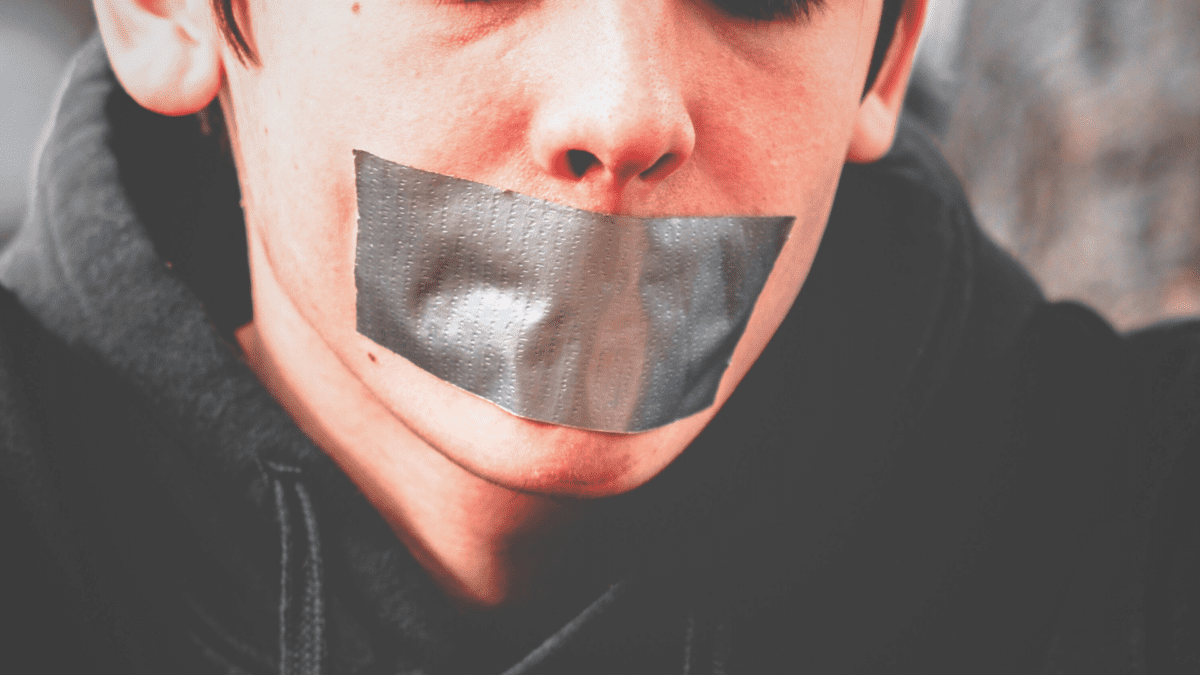By Amy Jones
“Enjoy Your Free Speech.”
—Mike Johnson
Speaker of the U.S. House of Representatives
In December of 1860, Frederick Douglas was slated to lead a discussion on the abolition of slavery for a Boston audience of fellow abolitionists. An angry mob opposing abolition took over the stage and shouted down the discussion. Six days later, in a gathering at Boston’s Music Hall, Douglass ended his lecture with a brief address criticizing how the earlier event was handled—by the protestors, Boston’s mayor, and even supporters of Douglass who expressed reluctance to criticize the mob’s clear violation of free speech. Douglass described the earlier meeting as having been “captured by a mob of gentlemen and dispersed by the order of the mayor, who refused to protect it…”1
Douglass went on to note the irony. These men who shouted him down were not rowdy, uneducated drunkards but “men who pride themselves upon their respect for law and order.” But as gentlemen proclaimed their “law of slavery,” he noted, the “law of free speech . . . [was] trampled under foot . . .” Douglass described this incident as “instructive.”2
How so? What can we, the citizens of the same nation, learn from this seemingly minor historical event, which happened 164 years ago? Surely, we have grown to understand and appreciate our right to freedom of speech.
Enjoy Your Free Speech
Maybe not. On April 25, 2024, Speaker of the U.S. House of Representatives, Mike Johnson, addressed the students and faculty at Columbia University, an institution he defines as “one of America’s preeminent academic institutions.”3 The purpose of his speech was to condemn the violent pro-Palestinian protests that had exploded on campus and to call for the resignation of Columbia’s president, Minouche Shafik, for her failure to protect freedom of speech on Columbia’s campus and enforce school policies protecting all students.
The same students, who had sought to silence and intimidate Jewish and pro-Israel students on campus, jeered and shouted, “We can’t hear you,” attempting to end Johnson’s speech just as the mob of gentlemen attempted to shout down Douglass. Undaunted, Johnson responded, “Enjoy your free speech,” and, in a similar spirit to that of Douglass, continued his address.4
Three Lessons From Douglas on Free Speech
These two incidents of lawless attacks on freedom of speech are startlingly similar regarding both the words and actions involved and the supposedly enlightened, privileged status of the perpetrators. It seems, after all, we should revisit the instructive lessons from our past. In Douglass’ closing comments at the Music Hall, he outlined three lessons he drew from his experience of having that freedom attacked.
- Every person, regardless of race, gender, social, economic, or educational status, has the same right to speak. No one is to be excluded. The freedom of speech is the common right of all men. Douglass stated, “No right was deemed by the fathers of the Government more sacred than the right of speech. It was in their eyes, as in the eyes of all thoughtful men, the great moral renovator of society and government.”5
- It is the responsibility of governmental and institutional authorities to lawfully uphold, protect, and defend all citizens’ freedom to speak. The equal enforcement of the law is critical. After chastising Boston’s mayor for capitulating to the angry mob, Douglass emphasized, “There can be no right of speech where any man, however, lifted up, or however humble, however young, or however old, is overawed by force, and compelled to suppress his honest sentiments.”6
- Freedom of speech provides opportunities to hear as well as to speak. Douglass wisely understood that it is as important to hear other people express their ideas freely as it is for us to freely speak our own. Our right to freedom of speech offers us a double blessing. Douglass concluded his speech with this reflection: “To suppress free speech is a double wrong. It violates the rights of the hearer as well as those of the speaker. It is just as criminal to rob a man of his right to speak and hear as it would be to rob him of his money.”7
Each of Douglass’s assertions have not only been confirmed and defended throughout America’s history, but policies protecting freedom of speech have been confirmed in liberal intergovernmental organizations, such as the United Nations and non-governmental organizations, such as Amnesty International.
A Universal Right That’s Not So Universal
The United Nations’ Universal Declaration of Human Rights was to set “a common standard of achievements for all peoples and all nations . . . fundamental human rights to be universally protected…”8 Article 19, in particular, addresses freedom of speech and states that the individual must have the right to freely express their opinions and ideas “without interference and to seek, receive, and impart information and ideas through any media and regardless of frontiers.”9 Amnesty International, an independent, international, non-governmental organization, states that its mission includes the commitment to help fight abuses of human rights worldwide and to free people jailed just for voicing their opinion.
Both international organizations support freedom of speech for all people echoing America’s First Amendment right which was ratified in 1791. The First Amendment was written well before both the writing of United Nations’ Universal Declaration of Human Rights in 1948 and the founding of Amnesty International in 1961 emphasizing America’s earlier declaration of our sacred right to freedom of speech.
The importance of Douglass’s second point that it is the responsibility of governmental and institutional authorities to lawfully defend a citizen’s freedom to speak has been exemplified by the widespread suppression of speech affirming conservative values, or in Columbia’s case, pro-Israel values in university classrooms and on campuses across the country in recent months. The failure of university administrators to defend this freedom and the rationalizations used to justify their actions is symptomatic of our country’s breakdown in protecting its citizens. This type of institutional cowardice and negligence has become blatantly obvious.
Douglass’ own response to this type of negligence was to strongly urge his Boston audience that “…the time to assert a right is the time when the right itself is called in question, and that the men of all others to assert it are the men to whom the right has been denied.”10
If We Are Brave, We’ll Win the Fight
Free speech requires a courageous defense not only from citizens but, most importantly, from the institutions responsible for upholding this freedom through equal application of the law, even in the face of threats and opposition. In an address to his organization, American Cornerstone Institute, Dr. Ben Carson states, “…if we are persistent…if we are courageous, if we are brave, we’ll win that fight.”11— the fight to avoid America’s movement toward being a totalitarian state where free speech is unsupported, or worse, opposed by law.
Douglass’s third point that freedom of speech provides opportunities for a citizen to hear as well as to speak, was articulated earlier in 1859 in the famous treatise, On Liberty, by the 19th-century English philosopher John Stuart Mill. He makes this point incisively.
“The peculiar evil of silencing the expression of opinion is, that it is robbing the human race; posterity as well as the existing generation; those who dissent from the opinion, still more than those who hold it. If the opinion is right, they are deprived of the opportunity of exchanging error for truth: if wrong, they lose, what is almost as great a benefit, the clearer perception and livelier impression of truth, produced by its collision with error. “12
This doctrine has come to be defined as the doctrine of counterspeech—”…is one of the most important free-expression principles in First Amendment jurisprudence.”13 It derives from the theory that audiences, or recipients of the expression, can weigh for themselves the values of competing ideas and, hopefully, follow the better approach.”14
Freedom of Speech Only Matters When You Don’t Like What Someone Has to Say
The danger of silencing speech has also been tested in our Supreme Court system. In the case of Whitney v. California (1927), Supreme Court Justice Louis D. Brandeis’s concurring opinion advanced the protection of the freedom of speech and has become a “…critical justifications for safeguarding freedom of speech even under the most challenging conditions.”15 He wrote: “If there be time to expose through discussion the falsehood and fallacies, to avert the evil by the processes of education, the remedy to be applied is more speech, not enforced silence.”16
The closing instructive comments by Douglass in December 1860 are as applicable today as they were 164 years ago. Our fight to protect and defend our freedom of speech for every citizen in our nation is crucial.
Douglass concluded his final remarks with the statement, “The principle [freedom of speech] must rest upon its own proper basis. And until the right is accorded to the humblest as freely as to the most exalted citizen, the government of Boston [and the United States of America] is but an empty name, and its freedom a mockery.
A man’s right to speak does not depend upon where he was born or upon his color. The simple quality of manhood is the solid basis of the right—and there let it rest forever.”17
Enjoy your free speech.

Amy Jones is an Instructional Designer for Classical Conversations®. She and her husband of 36 years raised four children in the beautiful foothills of the Tennessee Appalachian Mountains. Amy and Whit thoroughly enjoyed homeschooling their children through high school. During this journey, the Jones’ were blessed to participate in a Classical Conversations® community, even tutoring and directing several programs. Now blessed with nine grandchildren, Amy enjoys writing Classical Conversations® materials for young learners in the Scribblers tier.
- Douglass, Frederick. “A Plea for Free Speech in Boston (1860).” National Constitution Center – Constitutioncenter.Org, 2024, constitutioncenter.org/the-constitution/historic-document-library/detail/frederick-douglass-a-plea-for-free-speech-in-boston-1860. ↩︎
- Douglass, Frederick. ↩︎
- Allen, Hugh. “Mike Johnson Columbia Palestine Protest.” Rev, 2024, www.rev.com/blog/transcripts/mike-johnson-speaks-at-columbia-university ↩︎
- Allen, Hugh. “Mike Johnson Columbia Palestine Protest.” Rev, 2024, www.rev.com/blog/transcripts/mike-johnson-speaks-at-columbia-university ↩︎
- Douglass, Frederick. “A Plea for Free Speech in Boston (1860).” National Constitution Center – Constitutioncenter.Org, 2024, constitutioncenter.org/the-constitution/historic-document-library/detail/frederick-douglass-a-plea-for-free-speech-in-boston-1860 ↩︎
- Douglass, Frederick. ↩︎
- Douglass, Frederick. ↩︎
- Universal Declaration of Human Rights. United Nations, United Nations, www.un.org/en/about-us/universal-declaration-of-human-rights#:~:text=Article%2019,media%20and%20regardless%20of%20frontiers. Accessed 12 Aug. 2024. ↩︎
- Universal Declaration of Human Rights. ↩︎
- Douglass, Frederick. “A Plea for Free Speech in Boston (1860).” National Constitution Center – Constitutioncenter.Org, 2024, constitutioncenter.org/the-constitution/historic-document-library/detail/frederick-douglass-a-plea-for-free-speech-in-boston-1860. ↩︎
- Carson, Ben. “Dr. Ben Carson’s Most Important Speech.” Rick Walker Podcast, YouTube, 2023, www.youtube.com/watch?v=1h1Tj-Q6MxU&t=818s. ↩︎
- Mill, John Stuart. “John Stuart Mill.” Oxford Reference, 2024, www.oxfordreference.com/display/10.1093/acref/9780191843730.001.0001/q-oro-ed5-00007298. ↩︎
- “Counterspeech Doctrine Archives.” The Free Speech Center, firstamendment.mtsu.edu/encyclopedia/case/counterspeech-doctrine/#:~:text=The%20counterspeech%20doctrine%20posits%20that,hopefully%2C%20follow%20the%20better%20approach. Accessed 13 Aug. 2024. ↩︎
- “Counterspeech Doctrine Archives.” ↩︎
- Serafin, Tatiana. “Brandeis Concurring with Holmes in Whitney v. California, 1927.” First Amendment Watch, 30 Sept. 2022, firstamendmentwatch.org/history-speaks-brandeis-concurring-holmes-whitney-v-california-1927/. ↩︎
- Serafin, Tatiana. ↩︎
- Douglass, Frederick. “A Plea for Free Speech in Boston (1860).” National Constitution Center – Constitutioncenter.Org, 2024, constitutioncenter.org/the-constitution/historic-document-library/detail/frederick-douglass-a-plea-for-free-speech-in-boston-1860. ↩︎


